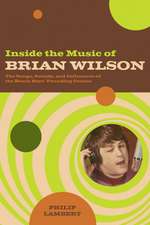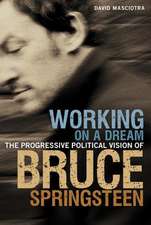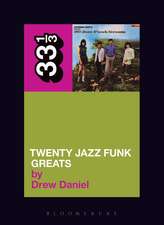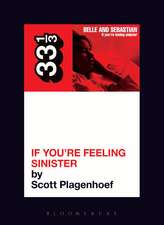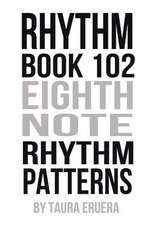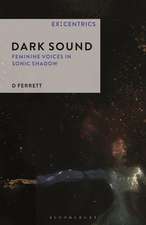Pop Music and Hip Ennui: A Sonic Fiction of Capitalist Realism
Autor Macon Holten Limba Engleză Hardback – 11 dec 2019
| Toate formatele și edițiile | Preț | Express |
|---|---|---|
| Paperback (1) | 216.79 lei 43-57 zile | |
| Bloomsbury Publishing – 16 iun 2021 | 216.79 lei 43-57 zile | |
| Hardback (1) | 772.58 lei 43-57 zile | |
| Bloomsbury Publishing – 11 dec 2019 | 772.58 lei 43-57 zile |
Preț: 772.58 lei
Preț vechi: 1112.20 lei
-31% Nou
Puncte Express: 1159
Preț estimativ în valută:
147.83€ • 154.76$ • 122.32£
147.83€ • 154.76$ • 122.32£
Carte tipărită la comandă
Livrare economică 07-21 aprilie
Preluare comenzi: 021 569.72.76
Specificații
ISBN-13: 9781501346668
ISBN-10: 1501346660
Pagini: 224
Dimensiuni: 152 x 229 x 19 mm
Greutate: 0.45 kg
Editura: Bloomsbury Publishing
Colecția Bloomsbury Academic
Locul publicării:New York, United States
ISBN-10: 1501346660
Pagini: 224
Dimensiuni: 152 x 229 x 19 mm
Greutate: 0.45 kg
Editura: Bloomsbury Publishing
Colecția Bloomsbury Academic
Locul publicării:New York, United States
Caracteristici
Provides secondary literature on the work of the influential cultural theorists Mark Fisher and Kodwo Eshun
Notă biografică
Macon Holt completed his PhD at the Centre for Cultural Studies, Goldsmiths, University of London, UK, in 2017. He is a contributing editor at the music magazine Passive/Aggressive, and his writing has appeared in Atlas Magasin, Blacklisted Copenhagen, The Ark Review, and Full Stop. He has taught at Lund University, Sweden, The Royal Danish Academy of Art, Denmark, and the Leeds College of Music, UK.
Cuprins
Preface AcknowledgmentsPart 1 Pop Music and Hip Ennui1. Kodwo Eshun: Sonic Fiction at Century's End2. Mark Fisher: Capitalist Realism after the Crash3. Sounds Like the Future Will Never ArrivePart 2 A Sonic Fiction of Capitalist RealismVignette: Jessie J at the Closing Ceremony of the 2012 London Olympics4. AttentionVignette: Busking on the London Underground 5. ComplicityVignette: On "Bored in the USA" on Letterman on YouTube (Now Removed)6. Catharsis Vignette: The Stones7. HomeVignette: One of Two: Carly Simon's New Boyfriend8. ConjunctionVignette: Two of Two: On Xiu Xiu and Mixing Notes ReferencesIndex
Recenzii
Kodwo Eshun and Mark Fisher meet at the London Olympics and watch David Letterman on YouTube: With his playfully written and erudite inquiry Macon Holt employs sonic fiction to trace the cracks of progressively imploding capitalist realism. One can read this scholarly work at the same time as an unsettling and disorienting essay and as a suggestive piece of speculative fiction. If I had to select one crucial study on popular culture this year - it would definitely be Holt's book.
Taking a lead from Mark Fisher's notion of capitalist realism and Kodwo Eshun's on sonic fiction, Macon Holt engages with the enjoyment of pop within our contemporary political climate. From how music shimmers, to affects, to memories, how we are hearing and feeling, and the way pop music captures attention, the book focuses the intersections of contemporary pop culture and political realities.
Pop Music and Hip Ennui offers a refreshing take on the cultural politics of recent popular music. Holt moves deftly between the analytical and abstract, on the one hand, and the personal and subjective, on the other. When he analyses particular musical works, the discussions are powerful and revealing. The book's singularity, together with its urgency in facing contemporary cultural dilemmas head-on, is why I consider it so valuable.
Taking a lead from Mark Fisher's notion of capitalist realism and Kodwo Eshun's on sonic fiction, Macon Holt engages with the enjoyment of pop within our contemporary political climate. From how music shimmers, to affects, to memories, how we are hearing and feeling, and the way pop music captures attention, the book focuses the intersections of contemporary pop culture and political realities.
Pop Music and Hip Ennui offers a refreshing take on the cultural politics of recent popular music. Holt moves deftly between the analytical and abstract, on the one hand, and the personal and subjective, on the other. When he analyses particular musical works, the discussions are powerful and revealing. The book's singularity, together with its urgency in facing contemporary cultural dilemmas head-on, is why I consider it so valuable.







